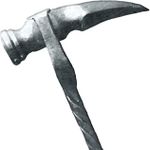War hammer
| ) | |
|---|---|
| Name | war hammer |
| Appearance | war hammer |
| Damage vs. small | 1d4+1 |
| Damage vs. large | 1d4 |
| To-hit bonus | 0 |
| Weapon skill | hammer |
| Size | one-handed |
| Base price | 5 zm (+10/positive enchant) |
| Weight | 50 |
| Material | iron |
A war hammer is a type of one-handed weapon that appears in NetHack. It is the base item for the artifact weapons Mjollnir and Ogresmasher.
Contents
Generation
War hammers make up ~1.5% of randomly generated weapons (on the floor, as death drops, or in shops).
Player monsters, including those on the Astral Plane, have a ~1.3% chance of generating with a war hammer as their initial weapon before role-based replacements[1] - as with other player monster weapons on the Astral Plane, the hammer has a 1⁄2 chance of being made into either Mjollnir or Ogresmasher if neither weapon has been generated.[2] Valkyries have a 1⁄2 chance of forcing a war hammer as their weapon.[3]
Hammer skill
| Hammer | |
|---|---|
| Max | Role |
| Basic | |
| Skilled | |
| Expert | |
The war hammer is the only weapon to use the hammer skill in vanilla NetHack. The lucern hammer is a type of polearm and uses this skill instead.
Strategy
The war hammer is generally an unremarkable weapon, with lower damage than the mace and the long sword. As a weapon skill, it is most relevant for those who find or receive Ogresmasher or Mjollnir.
Average damage calculation
The average damage calculations in the following table do not include bonuses from weapon skills, strength, or from using a blessed weapon against undead or demons.
| Weapon | Small monsters | Large monsters |
|---|---|---|
| +0 war hammer | 
|

|
| +7 war hammer | 
|

|
History
The war hammer first appears in NetHack 3.0.3.
The lucern hammer, which first appeas in NetHack 1.3d, was erroneously classified as using the hammer skill rather than polearm skill - this mistake was carried over from early editions of Dungeons & Dragons. In NetHack 3.0.0, this led to Thunderfist (the predecessor of Mjollnir) and Ogresmasher having the base item of a lucern hammer instead; the war hammer was introduced in part to correct this mistake.
Origin
The war hammer is a weapon that was formerly used in warfare, dating back to as far as the 2nd century BCE. Real-world war hammers were quite versatile weapons and were important for facing heavily-armored opponents much like maces. The blunt hammerhead would deliver concussive force through thick armor - including most chain mail and even plate mail - and the pick end on the opposite face could be used to punch holes, whether through a piece of armor or the odd skull. They could also be used in grappling.
The war hammer's hit die are derived from Advanced Dungeons & Dragons.
Variants
SLASH'EM
SLASH'EM adds a new type of hammer in the heavy hammer, which is stronger than the war hammer and acts as the new base item for Mjollnir.
xNetHack
In xNetHack, war hammers are made into a two-handed weapon that deals 2d6 damage to small creatures and 2d8 to large creatures.
EvilHack
EvilHack adds the heavy war hammer, a stronger type of hammer that acts as the new base item for Mjollnir and Ogresmasher. Hammers of any kind can also be used at a forge to create new weapons, armor and other objects.
Encyclopedia entry
They had come together at the ford of the Trident while the battle crashed around them, Robert with his warhammer and his great antlered helm, the Targaryen prince armored all in black. On his breastplate was the three-headed dragon of his House, wrought all in rubies that flashed like fire in the sunlight. The waters of the Trident ran red around the hooves of their destriers as they circled and clashed, again and again, until at last a crushing blow from Robert's hammer stove in the dragon and the chest behind it. When Ned had finally come on the scene, Rhaegar lay dead in the stream, while men of both armies scrambled in the swirling waters for rubies knocked free of his armor.
References
- ↑ src/mplayer.c in NetHack 3.6.7, line 155: 1⁄2 to get a random weapon - the designated range of objects covers weapons from the spear to the bullwhip inclusively in objects.c, and uses normal generation odds
- ↑ src/mplayer.c in NetHack 3.6.7, line 270
- ↑ src/mplayer.c in NetHack 3.6.7, line 239

